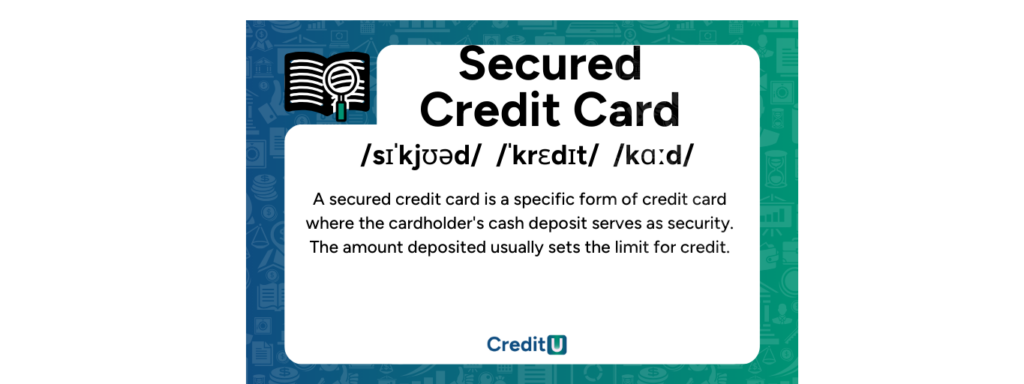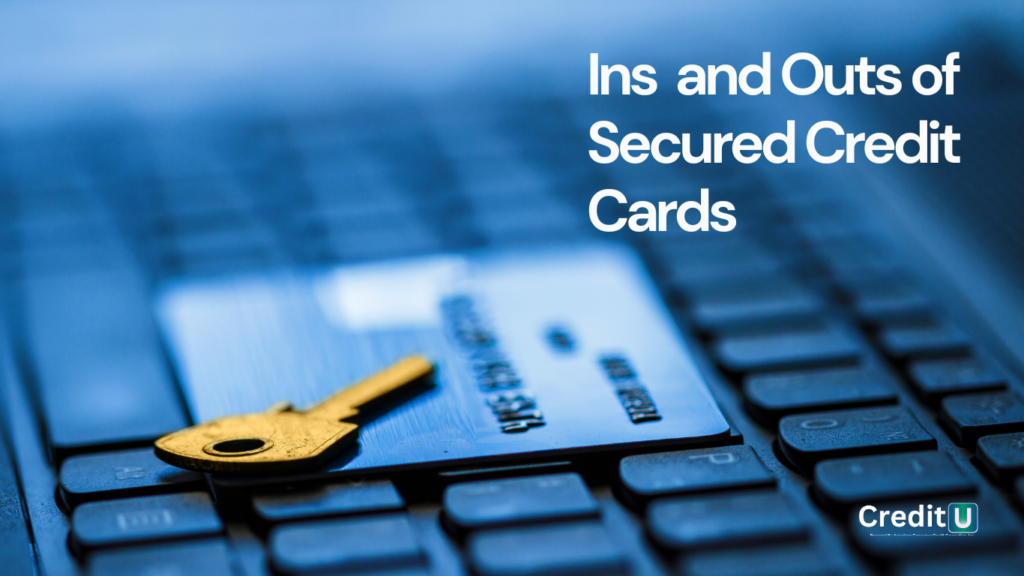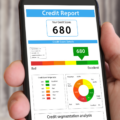What Is A Secured Credit Card and Why Should You Consider One?
January 26, 2024
In the realm of financial planning, managing and building credit is a crucial step towards achieving financial goals. A secured credit card emerges as a valuable tool in this process, especially for those grappling with credit card debt or new to credit. Let’s look at some key questions. What really are secured credit cards? What is its significance in debt management? Why is it an important aspect in your personal finance strategy?
Topics Covered: What is a Secured Credit Card? How do Secured Credit Cards Work What is the role of a secured credit card in Financial Planning? How can I open and close a Secured Credit Card? How do I change a secured card to an unsecured credit card? How Can CreditU Help? Key Insights
What is a Secured Credit Card?

A secured credit card is a type of credit card backed by a cash deposit from the cardholder. This deposit acts as collateral and typically determines your credit limit. For example, a $500 deposit would generally result in a credit limit close to $500. This characteristic sets secured credit cards different from unsecured cards, where the credit limits are determined by the cardholder’s credit worthiness.
Secured credit cards paves a way for people with no credit history or are rebuilding credit. Because an initial deposit acts as a collateral the credit card companies minimize their risk, making these cards more accessible than standard credit cards. This is a good stepping stone to build credit history.
How Do Secured Credit Cards Work?
Conventional credit cards are unsecured in nature. This means you are not putting up any of your own money or assets as a collateral, Therefore, there is nothing guaranteeing the creditor of your ability to pay off credit card debt. With unsecured credit cards you basically enter into an agreement with the creditor to pay off your debt in full or in part at the end of each month. Creditors protect them selves with higher interest rates for instances of delayed or non-payment.
Secured Credit cards on the other hand are protected. Because you put down the money for the credit limit before hand creditors do not have any risk worrying about repayment. However this is a valid form of credit for anyone starting to build credit. Responsibly using the available credit on your secured credit card alerts your creditors that you are credit worthy. The responsible behavior can lead to credit card companies offering you unsecured credit cards. Building a good credit history is an important part of your financial journey, Therefore this transition from a secured to an unsecured credit card is an important step too. The deposit aside, secured credit cards function like any credit card. Consumers typically obtain secured credit cards to improve their credit scores or establish a credit history. Secured credit cards typically have lower credit limits and more fees than unsecured credit cards do.1
What is the Role of a Secured Credit Card in Financial Planning?
Incorporating a secured credit card into your financial portfolio can have several benefits:
1. Credit Building:
Secured credit cards are reported to credit bureaus, making them an effective tool for building or improving your credit score. Timely payments and responsible usage reflect positively on your credit report, laying the groundwork for future financial endeavors like loans or unsecured credit cards.
2. Debt Management:
For those struggling with credit card debt, a secured card can be a step towards debt management. Since the credit limit is generally low, it encourages more mindful spending and prevents the accumulation of unmanageable debt.
3. Budget Discipline:
Using a secured card requires upfront cash, foster a sense of discipline in budgeting. It aligns with the principle of spending within your limits. This is a fundamental aspect of good financial planning.
4. Financial Goals:
Whether your goal is to buy a home, finance a car, or simply improve your financial standing, a healthy credit score is often essential. A secured credit card is a stepping stone towards achieving these goals.
How Do I Open and Close a Secured Credit Card?
Open a Secured Credit Card:
Just as you would apply for a unsecured credit card you will apply for a secured credit card. Almost all Credit card lenders will offer this product to their customers. They would look just like an unsecured credit card as well. These cards can be used anywhere and sometimes are eligible for perks and rewards. Secured credit cards may also come with annual fees or other charges imposed by the lender. They might include anything from initial set u and activation fees, credit limit increase fees and monthly maintenance fees.
Close a Secured Credit Card:
Closing a secured credit card can be done at your discretion any time. If you are current on your payments and do not carry an outstanding balance, you can contact the creditor and close your credit card. Once you close your card you will get your deposit back minus any fees you are obligated to pay to the creditor. Depending on how well you managed your secured credit card you r creditor may even offer you the option to convert to an unsecured credit card.
How can I change a secured credit card to an unsecured card?
The most fundamental requirement for you to upgrade to an unsecured credit card is that you make regular payments on your unsecured credit card. Once you have this requirement fulfilled your credit score begins to improve. You can keep tabs on your credit score via your credit reporting agencies or even your bank portals. Once you have a desirable credit score you have a good chance of being approved for a regular unsecured credit card. Some lenders offer this automatically. Make sure you continue to make regular payments on your secured credit cards and make good credit history to improve your chances of getting approval for an unsecured credit card.
What Can CreditU Do For You?
A secured credit card is an invaluable asset in your financial toolkit. Whether you’re starting out, recovering from past mistakes, or simply aiming to fortify your financial standing, a secured credit card, when used judiciously, can help pave the way to financial stability and success. It’s not just about getting a credit card; it’s about taking a proactive step towards realizing your financial dreams and goals.
The CreditU app can be a valuable tool for managing your finances and improving your credit score. One of the ways that CreditU can help is by providing you with access to your credit report and score. By regularly checking their credit report, you can identify any errors or discrepancies that may be negatively impacting your credit score. Additionally, the app can provide tips and suggestions for ways to improve your score, such as paying bills on time, reducing credit card balances, and limiting new credit applications.
CreditU can also help with credit scores by providing budgeting and tracking expenses features. By setting a budget and tracking expenses, you can avoid overspending and falling behind on bills, which can negatively impact your credit score.
The CreditU app is the perfect solution to manage your finances effectively and enhance your credit score. With a user-friendly interface, the app provides easy access to budgeting and tracking tools, and credit monitoring services. Take advantage of these features to remain financially organized and achieve your financial goals. For more information about CreditU, click here. Don’t forget to download the app today!
Key Insights
- Secured credit cards are a vital tool in financial planning. They bridge the gap for those new to credit or recovering from debt.
- A secured credit card is more than just a means to an end. it’s a financial education tool, teaching valuable lessons in credit usage and financial responsibility.
- A secured credit card is not a permanent solution. It’s a stepping stone to better financial health and should be used as part of a broader strategy that includes budgeting, saving, and debt management. By using a secured card wisely, you are laying a solid foundation for a healthier financial future, free from the shackles of debilitating credit card debt.
Last Updated on January 26, 2024 by Dilini Dias Dahanayake







